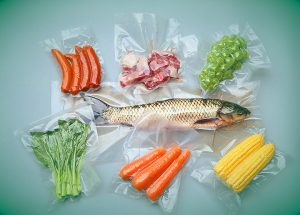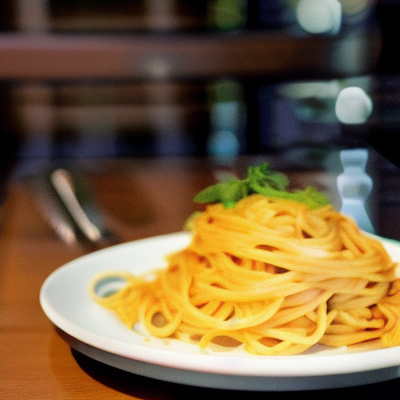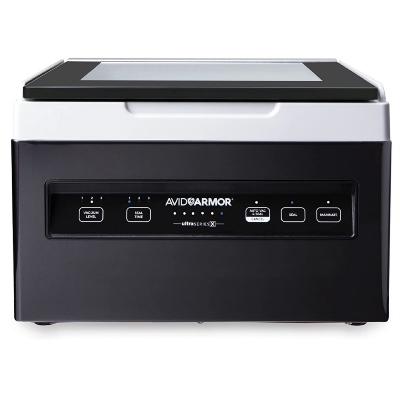
Vacuum sealers are great tools for preserving food, they are designed to remove the air from the bags to create a tight seal that helps to prevent spoilage and oxidation. This method is very useful for storing ingredients like meats, cheeses, and vegetables. Here are the most frequently asked questions about vacuum sealers.
Is a vacuum sealer worth it, what are the benefits?
There are many benefits of using a vacuum sealer:
Longer shelf and freezer life: Vacuum sealing can help to extend the shelf life of many types of food by preventing the growth of mold or bacteria. Frozen food that is vacuum-sealed can last up to 3 years, while non-vacuum-sealed food will last 6-12 months on average.
- Space-saving: When you vacuum seal your food, it will take up less space in the refrigerator or freezer.
- Portion control: Vacuum sealers are great for portioning out and storing food in smaller batches, which can be helpful for meal planning and portion control.
- Reduce food waste: Using a vacuum sealer will help to reduce food waste dramatically. It will allow you to store and preserve food for longer periods of time.
Overall, a vacuum sealer is a perfect machine for preserving and storing food longer. Vacuum-sealed food also protects its taste and texture better than food stored in traditional ways.
How much does a vacuum sealer cost in 2023?
Vacuum sealers can range in price from around $40 to $500, depending on the size, type, and features of the machine.
Budget-friendly options may have limited capabilities and be suitable for small sealing jobs with a need for a long cooling period between each seal, while more expensive models may be larger and be suitable for sealing larger quantities of food continuously.
Chamber vacuum sealers also cost more but they can vacuum seal liquid or juicy food including soups and sauces.
What should you not vacuum seal?
There are certain foods that you should avoid vacuum sealing:
- Raw mushrooms
- Garlic
- Very soft cheeses and unpasteurized cheeses are not suitable for vacuum sealing.
- Raw meats with sharp bones must be vacuum sealed very carefully as the bones can puncture the bag and compromise the seal
- Cooked or steamed vegetables that are still hot, you should wait for them to cool down to room temperature.
How long does vacuum-sealed food last?
The shelf life of vacuum-sealed food depends on the type of food and the storage method after vacuum-sealing.
- Vacuum-sealed meat (beef and poultry) can last from 2 to 3 years in the freezer, depending on the type of meat.
- Vacuum-sealed fish can last up to 2 years in the freezer
- Vacuum-sealed vegetables can last from 2 to 3 years in the freezer.
- Vacuum-sealed soups can last for 1 to 2 years in the freezer.
- Vacuum-sealed bread can last for 2 to 3 years in the freezer.
- Vacuum-sealed grains, such as rice and pasta, can last for 1 to 2 years in the refrigerator.
- Vacuum-sealed cheese can last for 4 to 8 months in the refrigerator.
Can you vacuum seal whole raw potatoes?
It is generally not recommended to vacuum seal whole raw potatoes and will not work.
If you would like to store potatoes in a vacuum seal for a longer period, you store them as half-cooked French fries or mashed potato patties.
Can you vacuum seal bread?
It is fine to vacuum seal your bread for storing in the freezer, but it will change its shape and volume due to the pressure.
Can you use a vacuum sealer for soup?
Yes, you can. To vacuum seal soups with normal vacuum sealers:
- Wait for the soup to cool to room temperature
- Freezing the soup in an ice cube tray
- Then vacuum seal the pieces while they are still frozen
Or use a chamber vacuum sealer, they can vacuum seal every kind of liquids with no problem.
Do you need a vacuum sealer for sous vide?
While a vacuum sealer is not required for sous vide cooking, the process is better when the food is sealed in airtight bags. Vacuum sealing allows the water to come into closer contact with the food, improving the heat transfer and helping to cook the food more evenly. Secondly and more importantly, the food will preserve the natural juices and flavors of the food, resulting in a more flavorful, moist, and tender result.
Can you reuse vacuum sealer bags?
While it is generally not recommended to reuse vacuum sealer bags, we all do this.
If you want to reuse vacuum sealer bags, it is best to do so for the same type of food since storing different types of food can lead to cross-contamination, as bacteria from one previous food can transfer to another. If you want to reuse your vacuum bag make sure that the bag is in good condition. Also never used bags that are previously used for storing meat, poultry, soup, and cheese.


